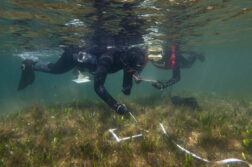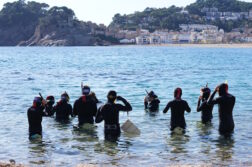Boring sponges (Cliona spp) have an important bioerosion activity on marine communities such as coral reefs of calcareous-substrate bottoms. They are unique in having both eukaryotic (zooxanthellae) and prokaryotic symbionts. We will assess how the symbionts respond to thermic and acidification stresses under a scenario of climate change, and how the activity of the sponges, and thus their impact on communities, is affected.
Boring sponges (Cliona spp) are a good model to study the interaction between symbioses and climate change and its impact on reef communities. Cliona sponges harbour symbiont zooxanthellae (Symbiodinium spp) also hosted by corals, in addition to a wide range of bacteria. The zooxanthellae of sponges appear to resist higher thermal conditions than coral-associated clades. A scenario of warming and increased acidification may therefore diminish coral calcification while enhancing sponge bioerosion rates, thus resulting in a detrimental impact for calcium carbonate-based reefs such as coral reefs or calcareous-substrate bottoms.
The objectives of the project SCOOBA are to assess how different symbiont compartments (Symbiodinium, bacteria) interact with each other and with their host under a climate change context. We will experimentally manipulate bacterial and Symbiodinium symbiont loads and submit experimental sponge aggregates to realistic situations of temperature and acidification. We will then measure feeding, growth, and boring activity of the sponges.
Our approach will allow us to tease apart symbiont contributions to the host, and to test their sensitivity to thermal and pH stress in the context of sponge physiology. Comparing microbial symbioses of tropical and temperate regions will also allow us to assess potential impacts of climate change on Mediterranean rocky bottoms inhabited by boring sponges.





